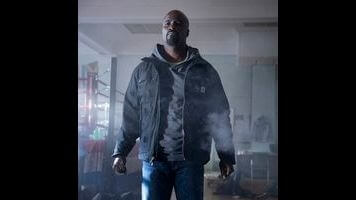Black skin matters in the electrifying Marvel’s Luke Cage

The past year hasn’t exactly represented the halcyon days of black America, and yet it’s given rise to the zenith of blackness in America. The silver lining around our tempestuous zeitgeist is that the country is being forced to consider blackness as its own distinct phenomenon. Even as some would declare race irrelevant—and it often is—they’ve also had to confront how Beyonce’s Lemonade made them feel, or consider why NBC’s The Wiz Live put a hard stop to the tradition of using live musicals in social media stoning rituals.
The most recent symbol of the new golden era of blackness is Marvel’s Luke Cage, Netflix’s latest entry in its very own Marvel Cinematic Universe and further proof that “blackness” may be the closest English approximation of “je ne sais quoi.” After first popping up in Netflix’s terrific Jessica Jones series, Mike Colter reprises his role as Marvel’s chain-gang John Henry, a totem of black masculinity with literally bulletproof skin. Colter, who so gamely played drug lord Lemond Bishop in The Good Wife, uses his physicality and gravitas to even better effect as the hero of the story. Luke Cage’s fleeting appearance in Jessica Jones hinted at great things to come, and the final product meets the high expectations.
Luke Cage mostly follows the storytelling template laid out by its Netflix predecessors. Its story unfolds at a slow and steady pace, initially to a fault. But as its pieces fall into place and the show relinquishes its potent origin story, Luke Cage becomes more intoxicating. Much of the show’s success has to do with Colter’s performance, which is, for lack of a less punny word, marvelous. He even manages to look like a badass while tossing off Luke’s hokey signature exclamation “Sweet Christmas!” It’s the kind of lead performance that could easily throw a show off balance, but Colter is well-matched with Mahershala Ali, whose unsettling charm and billion-watt smile are put to optimal use as the sinister Cornell “Cottonmouth” Stokes.












![HBO teases new Euphoria, Larry David, and much more in 2026 sizzle reel [Updated]](https://img.pastemagazine.com/wp-content/avuploads/2025/12/12100344/MixCollage-12-Dec-2025-09-56-AM-9137.jpg)



























